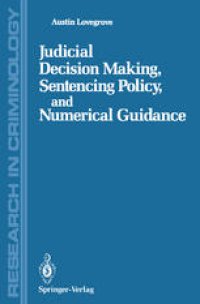
Ebook: Judicial Decision Making, Sentencing Policy, and Numerical Guidance
Author: Austin Lovegrove (auth.)
- Tags: Psychology general, Criminal Law
- Series: Research in Criminology
- Year: 1989
- Publisher: Springer-Verlag New York
- Edition: 1
- Language: English
- pdf
This book describes an original, empirical study of judicial decision making. The process of determining sentences is a difficult one for judges and often unnecessarily intuitive, subjective, and complex. The present study introduces a conceptual outline and empirical technique for increasing the precision of sentencing policy, thus offering an aid to judges who sentence in the light of this policy. The primary purpose of this model of judicial decision making is to provide a framework for scaling the seriousness of any single case in relation to the facts of that case and for relating this assessment to the appropriate quantum of sentence. The validity of the model is tested and cross-validated in an archival study. This innovative research serves as an important prototype for a system of numerical guidance to judges and sentencers.
This book describes an original, empirical study of judicial decision making. The process of determining sentences is a difficult one for judges and often unnecessarily intuitive, subjective, and complex. The present study introduces a conceptual outline and empirical technique for increasing the precision of sentencing policy, thus offering an aid to judges who sentence in the light of this policy. The primary purpose of this model of judicial decision making is to provide a framework for scaling the seriousness of any single case in relation to the facts of that case and for relating this assessment to the appropriate quantum of sentence. The validity of the model is tested and cross-validated in an archival study. This innovative research serves as an important prototype for a system of numerical guidance to judges and sentencers.